Australia is seeing a big rise in unlicensed offshore gambling, with billions going to websites outside the country’s rules. A study by H2 Gambling Capital for RWA estimates Australians lose about A$3.9bn a year, with losses expected to reach A$5bn by the end of the decade if current trends continue.
According to the report, offshore operators now make up around 36 percent of all online gambling activity in Australia. Because these companies are not licensed locally, governments are projected to miss out on almost A$2bn in tax revenue over the next five years. Sporting bodies and racing codes also face large shortfalls, with product fee losses expected to reach about A$800m over the same period.
Weak Protections for Consumers
RWA warns that the shift toward offshore gambling leaves Australians exposed to risks that the regulated market is meant to prevent. Locally licensed operators must follow strict rules such as verifying customer identities, monitoring behaviour and offering tools that help people control or reduce their gambling. None of these protections exist on sites that operate offshore.
RWA CEO Kai Cantwell said many of these websites are based in places with very little oversight. This means players can lose access to their money without clear ways to get help or resolve disputes. He said this lack of accountability weakens years of work by Australian regulators to build a safer and more responsible gambling environment.
Self Exclusion Challenges
The study also raised concerns about BetStop, Australia’s national self exclusion register launched three years ago. Researchers found that half of the Australians gambling on offshore websites were registered on BetStop at the time they placed their bets. This shows that people who have chosen to block themselves from gambling can still easily access offshore platforms.
Cantwell said this problem reduces the effectiveness of one of the country’s most important harm reduction tools. He also noted that offshore operators can attract customers with large bonuses, higher odds, online casino games and live in play betting, all of which are restricted or banned for licensed companies in Australia.
Call for a Wider Response
The report found that illegal operators often use influencers and affiliate ads to look legitimate. Almost half of the people surveyed said they had trouble telling legal sites from illegal ones. RWA said this shows how offshore companies use misleading tactics, while licensed operators rely on data and monitoring to protect players at risk.
Although regulators continue to block illegal domains, the Australian Communications and Media Authority has admitted it has limited powers. RWA said a broader response involving regulators, banks, digital platforms and sporting partners is needed to curb offshore gambling and reduce the harms linked to unregulated sites.

 Companies
Companies 





